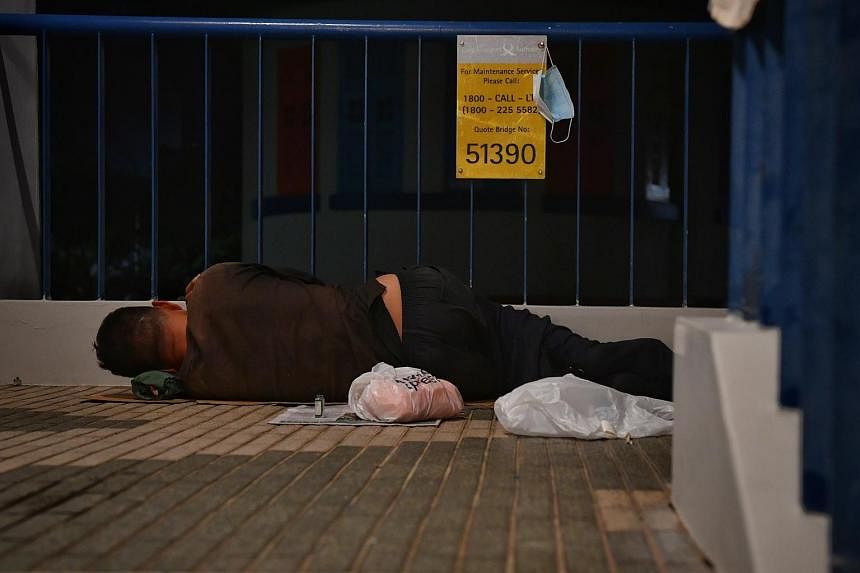Those made jobless during Covid-19 pandemic among new groups of homeless people: Study

Two new groups of homeless people emerged during the pandemic - those who lost their jobs, and those who commuted into Singapore but were affected by border restrictions. PHOTO: ST FILE
Theresa Tan and Shermaine Ang
PUBLISHED
4 HOURS AGO
FacebookTwitter
SINGAPORE - Two new groups of homeless persons emerged during the Covid-19 pandemic, a study on the state of homelessness in Singapore has found.
The first group comprises those who never slept on the streets before the pandemic but lost their jobs when Covid-19 struck and could not pay rent for a room on the open market.
The others in this group include those whose friends or relatives gave them shelter but had to leave those homes for reasons such as fear that the homeless person's stay would contravene the ban on social visits during the circuit breaker period.
This group includes both men and women, whose ages span the 30s to the 70s.
The second group is made up of mostly middle-aged Singaporean men who are wed to a Malaysian or Indonesian and they live in those countries but commute to Singapore for better-paying jobs here.
When the borders closed and a host of travel restrictions were imposed, they suddenly found themselves unable to travel back to Johor Bahru or Batam and had to sleep on the streets here.
The study is done by Dr Ng Kok Hoe, a senior research fellow at the Lee Kuan Yew School of Public Policy who led a team of researchers at the school's Social Inclusion Project to do the second nationwide street count of the homeless here.
Get tips to grow your investments and career in weekly newsletter
Sign up
By signing up, you agree to our Privacy Policy and Terms and Conditions.
Besides counting the number of homeless persons on the streets, the study involved in-depth interviews with 51 such individuals staying at a temporary shelter. Dr Ng said the study is the first local one of its kind here.
Besides the two groups of homeless people, there is also the third group comprising those who have been homeless even before the pandemic upended lives and livelihoods.
These long-term homeless persons have been on the streets from a few months to up to 25 years, and there are more men than women in this group. Their ages range from the 30s to the 70s.
The report said of this group, whose members live in "extreme poverty": "Participants (those interviewed) described being hungry and having to find protection from the rain and the cold.
"There were accounts of skipping meals for several days at a time, depending on generous passers-by to provide food, getting free meals from temples and mosques, and eating leftovers."
There are common factors that contribute to homelessness for the three groups, the report said.
Many work in low-wage jobs, earning about $1,000 a month. For some, their poor physical or mental health prevent them from being employed or working regularly.
Family conflict and estranged ties are another common problem they face.
They include those who sold their flats after their divorce, but ties are so strained that they have no family to turn to for refuge - even during a crisis.
For example, a 54-year-old woman who is separated from her husband was chased out of her room by her landlord.
She was quoted in the report as saying: "I went back to talk to my daughter about letting me stay till the pandemic is over. She told me to go kill myself."
And many of those interviewed are indifferent to catching the coronavirus, given that even their basic needs are not met, they said.
As a 39-year-old homeless woman quoted in the report said: "You think of where you're going to stay, where you're going to live, that's the most important thing. Because without a shelter, you don't feel safe. Even though you get the virus, whatsoever."
Mr Abraham Yeo, co-founder of the Homeless Hearts of Singapore, a charity that helps the homeless, said that there are quite a number of families who are now also at risk of becoming homeless. This is given the steadily rising rent on the open market and financial challenges they face.
